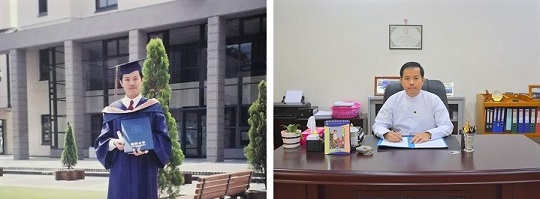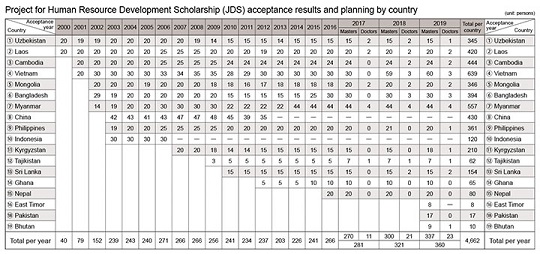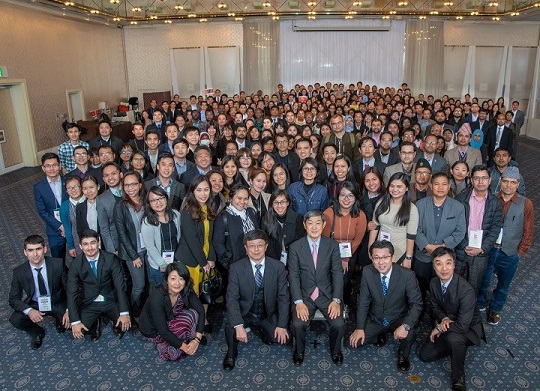- Home
- News & Features
- News
- FY2019
- Fostering leaders in developing countries: Myanmar Permanent Secretary of the Ministry of Foreign Affairs born from the JDS program
News
March 18, 2020
Fostering leaders in developing countries: Myanmar Permanent Secretary of the Ministry of Foreign Affairs born from the JDS program
“The biggest asset that I gained during my study in Japan is a large network of people. It is beneficial in building bilateral relations between Myanmar and Japan.”
Saying this with a smile is U Soe Han, who was appointed Permanent Secretary of the Ministry of Foreign Affairs of Myanmar in August 2019. He was one of the first group of students of the “Project for Human Resource Development Scholarship (JDS),” a human resource development program launched by JICA in 1999, which invites young government officials from developing countries to graduate schools in Japan. Over the 20-year history of the JDS, U Soe Han of Myanmar is the first person to be appointed as a vice-minister for foreign affairs.
 U Soe Han at the time of his study in Japan (left). He is working as Permanent Secretary of the Ministry of Foreign Affairs (right). (Photo courtesy of U Soe Han)
U Soe Han at the time of his study in Japan (left). He is working as Permanent Secretary of the Ministry of Foreign Affairs (right). (Photo courtesy of U Soe Han)
The JDS provides support to foster the expertise of young government officials who will be responsible for the future of developing countries, as well as for the development of human resources who will have an understanding of Japan, and the creation of their networks. So far, over 500 students have been accepted from Myanmar.
During his days as an international student in Niigata
 U Soe Han (right) at the time of his study in Japan. “Understanders of Japan” like himself, return to their home countries and play an active role. (Photo courtesy of U Soe Han)
U Soe Han (right) at the time of his study in Japan. “Understanders of Japan” like himself, return to their home countries and play an active role. (Photo courtesy of U Soe Han)
“I studied Business Administration at International University of Japan in Niigata Prefecture from 2002 to 2004 as one of the first group of students of the JDS from Myanmar and obtained an MBA. In various scholarships, the JDS provides Myanmar with the largest amount of grant. Student’s majors are related to the needs of Myanmar, and the allowance provided for the scholars is sufficient to cover their stay in Japan. Also, after a student has obtained a master’s degree, the JDS allows students to pursue a doctoral degree if they are eligible to apply for it,” says U Soe Han.
“In Niigata, I learned about the local lifestyle and Japanese culture in rural areas through interaction with local people. What surprised me most of all was that Japan has well-equipped and advanced university facilities not only in large cities but also in the rural areas as well,” U Soe Han recalls his days as a student. “I like snow, so I also participated in many winter sports such as skiing. Of course, I love the famous Niigata sake too!”
Learn the way of life and culture; serve the purpose of mutual understanding
“Having learned Japanese lifestyles and culture, it is now helping me in considering the interrelationships between Japan and Myanmar,” says U Soe Han. One of the main objectives of the JDS is to nurture people who understand Japan at core institutions of developing countries and to boost the expansion of the foundation of friendly relations with Japan.
U Soe Han, who serves as the head of Myanmar’s Foreign Affairs Administration, talks about his future aspirations as follows:
As one of the responsible high-level officials of the Ministry of Foreign Affairs, I hope to successfully implement Myanmar’s foreign policy and promote Myanmar’s interests on the international stage. I expect more development assistance and human resource development projects by JICA including the JDS, and I, too, would like to support such development.”
Accepting over 4,600 international students in total
The JDS selects from priority areas of developing countries and areas related to development issues with a focus on social sciences, such as government, public policy, economy, and law. The JDS is characterized by a scholarship support system that prioritizes the needs of counterpart countries. In recent years, the JDS is aiming at fostering leaders in developing countries who make broad-based decisions and policy judgements based on their advanced knowledge and research capabilities. The number of JDS students returning to Japan as doctoral candidates in the fields of “policy science” and “international cooperation research” has increased.
In 2019, the JDS accepted 360 students from 16 countries. Over 4,600 international students have visited Japan to date, combining masters and doctoral programs. The JDS has provided scholarships to young government officials in developing countries and provided them with opportunities and locations to conduct research for two years under master’s degree programs at Japanese universities.

There are many JDS graduates like U Soe Han who are aiming to become leaders active in the development of their home countries.
Batugoda Gedara Siri Karunaratne of Sri Lanka studied at Tsukuba University for two years from 2015 to 2017. After researching the possibility of applying Japan's "Waste Management technology with low environmental impact” to his home country, he returned to Sri Lanka and was immediately involved in a project to develop a final waste disposal site in Kandy Province, and made use of his experience in Japan's land-use plan and waste management.
After completing his exchange program, Daniyar Imanaliev of Kyrgyzstan took office as Director of the Economic and Investment Department of the Prime Minister's Office and Deputy Minister of the Ministry of Economy, and was afterwards appointed Director of the Strategic Development, Economic and Monetary Policy Bureau of the President's Office. The Director of the President's Office is the "brain of the government," and is involved in all policymaking in the economic sphere of the Kyrgyz government.
In the future, in cooperation with JICA's Graduate School of Development, the opportunities for international students to learn about Japan's modern development experience and knowledge as a post-war donor country will be increased. Also, we will plan activities for international students residing in various parts of Japan to learn about their region and deepen interaction with local residents, as well as provide support for the creation of networks among international students through events such as alumni reunions. JICA will contribute to the development of human resources in developing countries and the establishment of networks with Japan while continuing to accept international students based on the JDS.
 Students who participated in the JDS Interim Training Program in March 2019
Students who participated in the JDS Interim Training Program in March 2019
- About JICA
- News & Features
- Countries & Regions
- Our Work
- Thematic Issues
- Types of Assistance
- Partnerships with Other Development Partners
- Climate Change / Environmental and Social Considerations
- Evaluations
- Compliance and Anti-corruption
- Science and Technology Cooperation on Global Issues
- Research
- JICA Development Studies Program / JICA Chair
- Support for the Acceptance of Foreign HRs / Multicultural and Inclusive Community
- Publications
- Investor Relations





